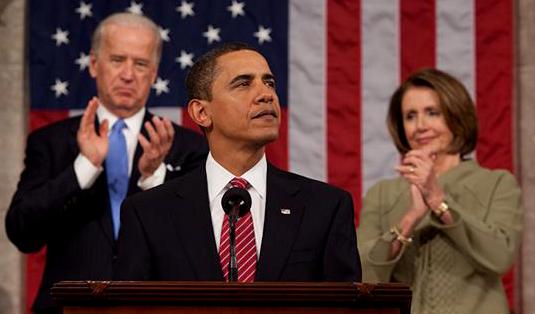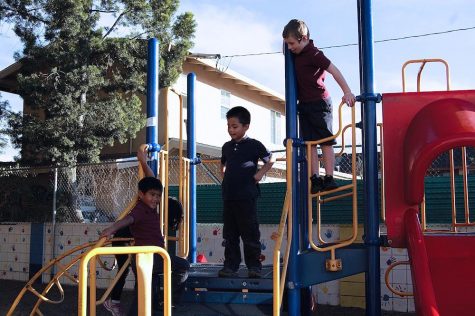Obama’s ‘free community college’ proposal is flawed

photo via wikipedia.org under the Creative Commons license
Obama delivering a speech at joint session of Congress with Vice President Joe Biden and House Speaker Nancy Pelosi.
The president’s good intentions to expand higher education are misplaced in his plan to make community college free.
On Jan. 9, President Obama announced his proposal to sign legislation that will make the first two years of community college free “for everybody who is willing to work for it.” Student who reach criteria under this program will need to attend school at least half time, keep up at least a 2.5 GPA and display progress in completing a degree or certification program.
Although I agree that everyone should have access to higher education, I do not agree with the president’s proposal.
My major concern is the cost of enacting this legislation. While hearing “free community college” and “benefits for 9 million students” sounds appealing, we must be realistic. According to White House spokesperson Eric Schultz, the plan is expected to cost the government over $60 billion in 10 years. In economics class, we learned that “there is no such thing as a free lunch,” meaning that someone, most likely taxpayers, will have to fund some part of the program.
Although tax money going towards higher education is a valuable investment for the future generation, students who come from families who cannot afford to pay for a higher education and are dedicated to their studies already receive substantial federal aid or scholarships to pursue their studies, with some grants even covering their whole tuition. I fear that abolishing tuition would only transform the two years of higher education to just a continuation of free, public high school. By investing not only their time, but some money in higher education, students are given more incentive to progress than if they were only motivated by the education being “free.”
According to The New York Times, in Nov. 2014 the University of California Board of Regents gave approval to raise tuition 27.6% over the the next five years, raising the undergraduate tuition for California residents from about $12,000 to $15,500. Currently, tuition for community colleges, on the other hand, is about $3,000. It is unfair to raise tuition for students in one education system while abolishing the tuition for another group.
The gap between community colleges and, for instance, UCs, is already apparent. For example, several of my friends believe that a major problem in community colleges is the over-enrollment. They find it difficult to sign up for their required classes and end up taking classes they don’t need. According to Forbes, “for every ten students that enter community college, only three graduate within three years.” If the plan is enacted, the number of students in community colleges will increase exponentially, making it even more difficult for students to enroll in classes.
While I’m glad that the federal government is placing emphasis on expanding the higher education system and making it more affordable for everyone, I believe that there are different ways to approach this goal. I agreed with President Obama when he said that “we also have to make sure that everybody has the opportunity to train themselves for better jobs, better wages, better benefits.” However, making community college free does not necessarily mean that the students will receive the proper education they need to attain their goals.
Instead of worrying about the already relatively low cost of community colleges, the government should work on improving that quality of education at community and public colleges. Government should first prioritize bettering the current conditions of community colleges by hiring more teachers, creating more classrooms, and maintaining facilities and technologies. This way, whatever amount students pay for their higher education is not wasted. Even though Obama plans to address his proposal in his Jan. 20 State of the Union address, I don’t believe that the legislation should or will be passed.












